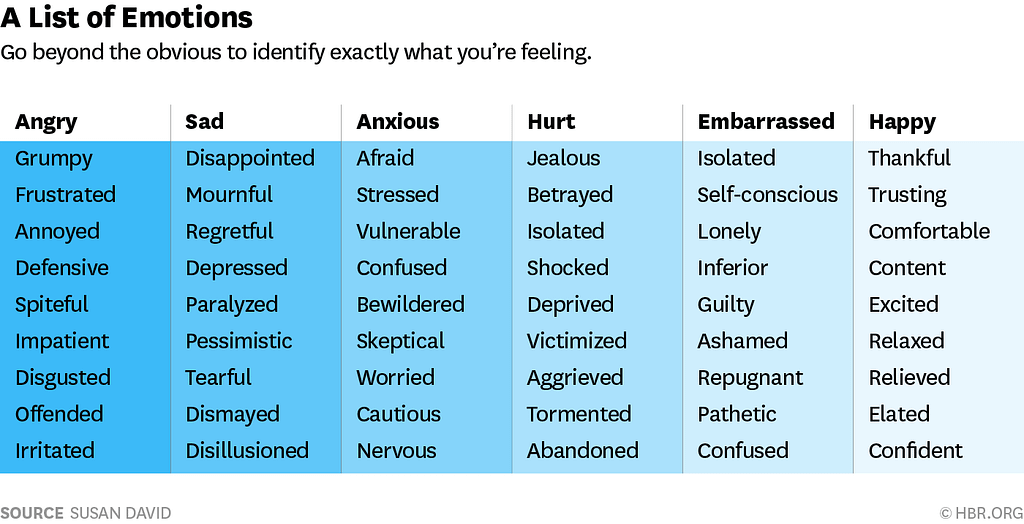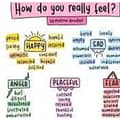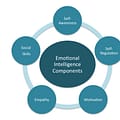If you are a Manager/ Leader who is aspiring to develop a higher emotional intelligence, it is important to develop a rich emotional vocabulary.
You need to support your emotional growth by expanding your emotional vocabulary for communicating effectively.
Researchers have found that a rich emotional vocabulary helps you to identify, and express your emotions productively.
People who have a rich vocabulary can understand themselves and the world around them better.
They can identify and express their emotions quickly (instead of hitting out, exploding, or suppressing them) and express their feelings accurately.
The purpose of this post is to help you know: Why it is important to develop a strong emotional vocabulary and How to improve your emotional vocabulary to develop higher emotional intelligence.
As humans , we all experience a broad spectrum of complex feelings , and these emotions contain certain information or intelligence about ourselves and the world around us .
Everyday , we experience a wide range of different emotions such as happiness, surprise , joy, irritation ,frustration ,trust ,disappointment, sadness ,anger calm, love and excitement .
Experiencing negative emotions is natural and when they get in your way, it can be difficult for you and others in the organization to navigate comfortably.
Big intense feelings may overpower you and you may lose control over yourself and react explosively and hurt yourself or others.
On the other hand, bottling or suppressing your feelings only leads to reactions and explosions in the workplace, which is counterproductive for the organizational culture, productivity, mental health, and well-being of all employees.
READ THE POST –THE PROCESS OF EMOTIONS EVERY NEW MANAGER MUST KNOW
Your feelings affect your behavior. You need to express both positive and negative feelings appropriately.
To express your emotions and feelings accurately, it is important to describe how you are feeling, and here is where a robust emotional vocabulary comes in handy.
Emotions are very subtle and using the right word to express them is very important for effective communication.
For example , there is a difference between ‘’ Ecstatic’’ and ‘’Excited’’ and ‘’ Angry’’ and ‘’ Bitter’’
”Poetry is when an emotion has found its thought and the thought has found words.”
Robert Frost
A rich emotional vocabulary means being able to identify, label and understand feelings in yourself and others.
It prevents you from describing your feelings in a vague, abstract, or generalized way
Here are some benefits of having a Rich Emotional Vocabulary:
-
You can notice your emotions.
-
You can name your emotions. This means finding the appropriate words that describe your emotions: excited, energized, confident, joyful, content, discouraged, etc.
-
You can Interpret your emotions. -Once you can notice and name your emotions, it becomes easier to explore the reasons why you might be feeling in a certain way. You can use the information to let your emotions serve as a guide to you and you will be able to regulate your emotions more quickly and take effective emotional action.
Anger can help you to fight against a problem. Fear can help you take preventive action.
It is important to communicate your feelings even if they make you uncomfortable. And to manage your emotions you need to have words to express them accurately.
.
4. Better emotional vocabulary helps you develop better emotional skills. For example -emotions that you experience may have subtle differences between them -like anger, rage, annoyance, and irritation.
Some emotions can be contradictory, like a combination of excitement and fear when you get promoted, and sadness and excitement when moving to a new workplace.
Understanding the subtle nuances of emotions in this vast landscape of emotions calls for a rich emotional vocabulary.
It will help you to understand and express your emotions effectively.
5. You can understand others and empathize with them. This helps you build trust with others in your workplace and you can cultivate healthy relationships with everyone in the workplace.
Therefore when you have good work relationships you enjoy going to your workplace.
Emotional literacy helps you to articulate more precisely.
6. It supports your emotional, physical, and mental health because you can put words to your feelings and label them. Labeling them helps you to disengage from them and choose how to respond rather than be overpowered by them and react inappropriately.
5 THINGS YOU CAN DO TO IMPROVE YOUR EMOTIONAL VOCABULARY
Here are 5 activities that can help you enrich your emotional vocabulary :
1.Read Topical Books
To improve your emotional literacy read topical books where emotions are explored.
When you are reading such books contemplate how the main character is feeling in certain difficult or pleasant situations.
Empathise with him/her. Guess how a character in the book is feeling.
Ask follow-up questions, like:
-
“How can you tell?”
-
“Why might they be feeling this way?”
-
“What are some other words you can use to describe that feeling?”
-
“What feeling is the opposite of what that character is feeling?”
-
“When you’re feeling _________, how do you show it?”
2.Make a List of Feelings
On a piece of paper write down all the feelings and emotions you can think of.
Make a face beside each feeling and explain a situation in which such a feeling or emotion might arise.
3.Keep a Feelings Journal
A feelings journal is a good way for you to keep track of your emotions and the situations in which you feel them.
You can use them later on to devise better ways to deal with them next time.
4.Role-play Social Narratives and Review
Doing role play and reviewing them or creating social narratives is one powerful way of improving your emotional vocabulary.
Come up with scenarios you might encounter in the workplace and act out how others might act and react.
Go over situations that didn’t end well, examine the emotions of the people involved, and try to think about what could have been.
Our emotions have an important role to play in signaling us when our needs are not met.
Becoming aware of these signals is an important first step.
Use this as a guide to communicating more effectively so that your needs may be met.
For example –
In the workplace: Think of a situation in which you felt a need of yours was unmet.
-
-
What was the need (e.g. freedom of expression)?
-
What emotions surfaced when this need was unmet? (e.g., frustration, disappointment )?
-
How can you communicate this need more effectively to a coworker/supervisor/etc? (e.g., “I could make a better contribution if I was given the autonomy to try it my way first”)?
-
5. Use A List Of Feelings And Emotional Words
Below is a list of feelings and emotional words both positive and negative.
You can use this list of words to expand your vocabulary with a little practice.
Spend some time studying it. Notice what words you use the most. Try using words that you normally never use.
Next time you are caught in a difficult situation use emotional words to express what you are feeling in the moment.
For example, if the server in the bank is down and the transaction is delayed , then say, ‘’I’m frustrated that it is taking longer than expected .’’ Or ‘’ I’m running late and that makes me feel scared about missing an appointment with an important client .’’
LIST OF NEGATIVE AND POSITIVE EMOTIONS AND WORDS TO EXPRESS FEELINGS
SAD |
Unhappy-sorrowful-dejected-regretful-depressed-downcast-miserable-downhearted-down-despondent-despairing-disconsolate-out of sorts-Despondent disappointed-Miserable |
HATE |
Hateful Resentful –Loathe-detest-dislike greatly-abhor-abominate-despise-execrate-feel aversion towards-feel revulsion towards-feel hostile towards-be repelled by-Apathy |
GRIEF |
sorrow-misery-sadness-anguish-pain-distress-agony-torment-affliction-suffering-heartache-heartbreak-Grieved-Grim-Heavy hearted -Grieving Sorrowful-Mournful-Bereaved -Despairing -Despondent -Grief-stricken – Heartbroken – Hopeless – Inconsolable – Morose |
ANGER |
Abrasive – Abusive – Aggravated – Aggressive – Annoyed – Appalled – Bitter Boiling – Bugged Cranky – Cross Enraged – Exasperated – Fiery – Frustrated – Fuming – Furious Exasperated – Incensed – Indignant – Inflamed – Mad – Inflamed – Infuriated – Offensive – Outraged – Seething – Sore – Spiteful – Annoyed – Apathetic Riled up – Bitter – Contemptuous – Furious – Outraged – Seething – Spiteful – Vengeful – Vicious – Vindictive – Violent |
DEPRESSED |
Dismayed -Gloomy -Grave -Grey-Abominable – Abysmal – Accursed – Ashamed – Bad – Besieged – Black – Dark – Despairing – Despicable – Diminished – Dissatisfied – Dour – Dreary – Dysphoric – Guilty – Loathsome – Lousy – Morbid – Morose – Repugnant – Self-abasing – Self-destructive – Sense of loss – Sulky – Terrible – Worn out |
CONFUSED |
Addled – Ambivalent – Anxious – At a loss – Baffled – Befuddled – Bewildered – Conflicted – Confused – Disconcerted – Distracted – Doubtful – Flustered – Hesitant – Indecisive – Lost – Misgiving – Muddled – Mystified – Perplexed – Puzzled – Tense – Uncertain – Uneasy – Unsure |
FEAR |
Alarmed afraid – Anxious – Boxed-in – Chilled – Cornered – Cowardly – Doubtful – Fear – Frightened – Jittery – Jumpy – Menaced – Overwhelmed – Quaking – Scared – Shaken –Spooked – Suspicious – Terrified – Threatened – Uneasy – Wary – Worried-terror-Fright -alarm-panic-agitation-Trepidation -horror -dread-consternation-dismay-distress-anxiety-worry-angst-unease |
PANIC |
Dread – Horrified – Panicked – Paralyzed – Petrified – Phobic – Shocked – Terrorized |
JEALOUSY & ENVY |
Disbelieving – Distrustful – Insecure – Protective – Suspicious – Vulnerable -Covetous – Demanding – Desirous – Envious – Jealous – Threatened- Gluttonous – Grasping – Greedy – Green with Envy -Persistently Jealous -Possessive – Resentful |
EMBARRASSED |
Absurd – Ashamed – Awkward – Clumsy – Conspicuous – Disgraced – Foolish – Humiliated – Mortified – Silly – Uncomfortable |
SHAME |
Ashamed – Chagrined – Contrite – Culpable – Embarrassed – Humbled – Intimidated- Penitent – Regretful – Remorseful – Reproachful – Rueful – Sheepish- Belittled – Degraded – Demeaned – Disgraced – Humiliated – Mortified – Ostracized – Self-condemning – Self-flagellating – Shamefaced – Stigmatized |
DEPRESSED |
Abominable – Abysmal – Accursed – Ashamed – Bad – Besieged – Black – Dark – Despairing – Despicable – Diminished – Dissatisfied – Dour – Dreary – Dysphoric – Guilty – Loathsome – Lousy – Morbid – Morose – Repugnant – Self-abasing – Self-destructive – Sense of loss – Suicidal – Sulky – Terrible – Worn out |
VULNERABLE |
Bare – Bested – Blind – Broken – Bullied – Captive – Conned – Conspicuous – Constrained – Controlled – Corralled – Delicate – Eclipsed – Expendable – Exposed – Little – Lost – Obscured – One-down – One-upped – Open – Raw – Sensitive – Small – Susceptible – Weak |
SHOCKED |
Agape – Aghast – Agog – Astonished – Astounded – Awestruck – Dazed – Dumbfounded – Dumbstruck – Dumfounded – Flabbergasted – Jarred – Jolted – Rattled – Startled – Stricken – Stunned – Stupefied |
GUILTY |
Accountable – At fault – Contrite – Culpable – Deceitful – Faulty – Regretful – Remorseful – Responsible – Rueful – Undeserving – WrongGuilt-ridden – Guilt-stricken- Guilty |
INADEQUATE |
Deficient – Enfeebled – Helpless – Incapable – Incompetent – Inept – Inferior – Insecure – Insufficient – Mediocre – Meek – One-down – Pathetic – Powerless – Second rate – Spineless – Unworthy – Useless – Weak – Worthless |
ANXIOUS |
Daunted – Dreading – Frantic – Fretful – Guarded – Insecure – Jangled – Knotted – Nervous – Neurotic – Obsessive – Overcome – Panicky – Preoccupied – Restless – Ruffled – Self-conscious – Shaky – Shy – Skittish – Stressed – Timid – Unnerved |
NEGATIVE |
Against – Averse – Disharmonious – Hesitant – Opposed – Oppositional – Quarrelsome – Rebellious – Recalcitrant – Resistant – Stubborn |
TIRED |
Battle-worn – Bedraggled – Careworn – Depleted – Dispirited – Done-in – Downtrodden – Drained – Dried up – Exhausted – Faint – Finished – Fried – Harried – Hassled – Limp – Listless – Overdrawn – Overloaded – Pooped – Spent – Strained – Stretched – Used up – Weary – Worn out |
ALONE |
Abandoned – Alienated – Aloof – Antisocial – Apart – Avoided – Bypassed – Deserted – Desolate – Disliked – Dispossessed – Disregarded – Dissociated – Distant – Estranged – Excluded – Friendless – Ignored – Inaccessible – Isolated – Jilted – Longing – Loveless – Needy – Outnumbered – Rejected |
AFRAID |
Alarmed – Anxious – Boxed-in – Chilled – Cornered – Cowardly – Doubtful – Fear – Frightened – Jittery – Jumpy – Menaced – Overwhelmed – Quaking – Scared – Shaken –Spooked – Suspicious – Terrified – Threatened – Uneasy – Wary – Worried |
INDIFFERENT |
Absent – Apathetic – Banal – Bland – Blasé – Bored – Cavalier – Cold – Dead – Disinterested – Dulled – Emotionless – Empty – Insensitive – Lifeless – Mindless – Neutral – Nonchalant – Reserved – Robotic – Uncaring – Weary |
BORED |
Bland – Dreary – Listless – Mundane – Tedious – Unchallenged – Understimulated |
HURT |
Abased – Abused – Aching – Afflicted – Agonized – Annihilated – Assaulted – Betrayed – Blamed – Bleeding – Brutalized – Burned – Bushwhacked – Chastised – Cheated – Crushed – Damaged – Defeated – Deflated – Dejected – Deprived – Devalued – Diminished – Disrespected – Forgotten – Heart-broken – Humiliated – Ignored – Injured – Insulted – Intimidated – Invalidated – Invisible – Jilted – Laughed at – Neglected – Offended – Oppressed – Pained – Persecuted – Punched – Put down – Rebuffed – Rejected – Ridiculed – Screwed – Slighted – Snubbed – Squashed – Tormented – Tortured – Victimized – Wronged |
LOST |
Planless –Rudderless – Scattered – Seeking – Stranded – Stumped |
HELPLESS |
Alone – Controlled – Despairing – Distressed – Dominated – Empty – Fatigued – Forced – Frustrated – Futile – Hesitant – Hindered – Immobile – Impotent – Incapable – Ineffective – Inferior – Lame – Micro-managed – Overwhelmed – Paralyzed – Pathetic – Stifled – Stonewalled – Straight-jacketed – Stuck – Tragic – Useless – Vulnerable – Woeful |
HAPPINESS |
Blissful – Bouncy – Buoyant – Cheerful – Delighted – Elated – Exuberant – – Fortunate – Glad – Gleeful – Great – Joyous – Jubilant – Merry – Mirthful – Peachy – Perky – Satisfied – Soaring – Sparkling – Sunny – Amused – Friendly – Hopeful – Inspired – Jovial – Open -Peaceful – Smiling – Cheerful – Contented -Delighted – Excited – Fulfilled – Glad – Gleeful -Gratified – Happy- Joyful – Lively – Merry -Optimistic – Playful – Pleased – Rejuvenated – Satisfied- Awe-filled – Blissful – Ecstatic – Elated – Enthralled – Euphoric – Exhilarated – Jubilant -Overjoyed – Radiant – Rapturous – Thrilled |
POSITIVE |
Anxious – Complimented – Determined – Eager – Earnest – Enthusiastic – Excited – Hopeful – Inspired – Intent – Keen – Productive – Pumped – Sincere |
ALIVE |
Animated – Awake – Colorful – Courageous – Electric – Energetic – Free – Frisky – Glorious – Glowing – Impulsive – Liberated – Optimistic – Peppy – Playful – Provocative – Reborn – Spirited – Spunky – Thrilled – Wonderful |
THANKFUL |
Appreciative – Beholden – Grateful – Obliged – Owing |
ACCEPTABLE |
Adequate – Average – Functional – Good enough – Legitimate – Okay |
OPEN |
Aboard – Accepting – Adventurous – Amazed – Boundless – Confident – Easy – Exultant – Free – Fun-loving – Interested – Kind – Ready – Receptive – Reliable – Satisfied – Sympathetic – Understanding |
CALM |
Breezy – Relaxed – Chill – Released – Resolved – Sleepy |
LOVE |
Admiration – Affectionate – Attracted – Caring – Connection – Considerate – Cuddly – Devoted – Love – Passionate – Sensitive – Tender – WarmthAffectionate – Attached – Benevolent – Communicative – Connected – Cuddly – Dedicated – Empathetic – Generous – Gracious – In tune – Loving – Loyal – Nurturing – Responsible – Selfless – Sympathetic – Warm |
Do you want to Master your Emotional Intelligence and Deal with Difficult Emotions Mindfully? Get the FREE GUIDE below .

CONCLUSION
Developing your emotional vocabulary is essential for mental, emotional, and physical well-being because then you don’t talk about your feelings in terms of good or bad.
Defining your feelings as good and bad only limits your capacity to identify and recognize them and only reinforces guilt and shame.
Shame and guilt are heavy emotions that only make you repress your feelings and prevent you from expressing yourself freely.
The more you invest in strengthening your emotional vocabulary, the better the quality of your relationships with your partner, friends, co-workers, and yourself.
The more extensive your emotional vocabulary, the more understanding and empathetic you can become with other people’s needs and feelings.
The earlier you develop an emotional vocabulary—and it’s never too early or too late to start—the better your chances of cultivating emotional maturity and inner growth as a professional and leader in your organization.
I hope you have understood why it is important to increase your emotional vocabulary to express your emotions accurately for effective communication with the exercises and list of feelings and emotional words so that you can develop higher emotional intelligence.
How helpful was the post? What is your biggest takeaway from this post? Please share your thoughts below.
Babita Sharma
Leadership Coach
www.leadwithpassion.co.in







